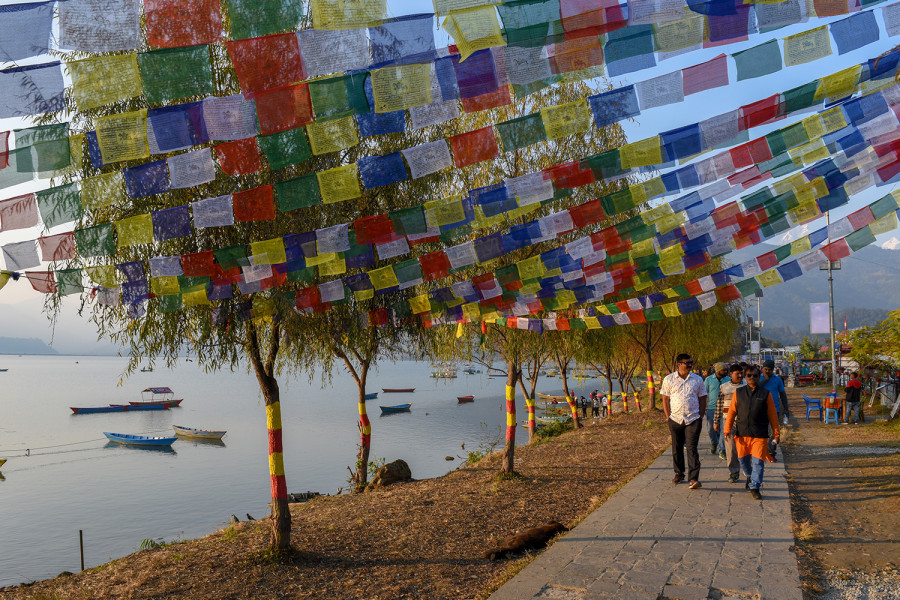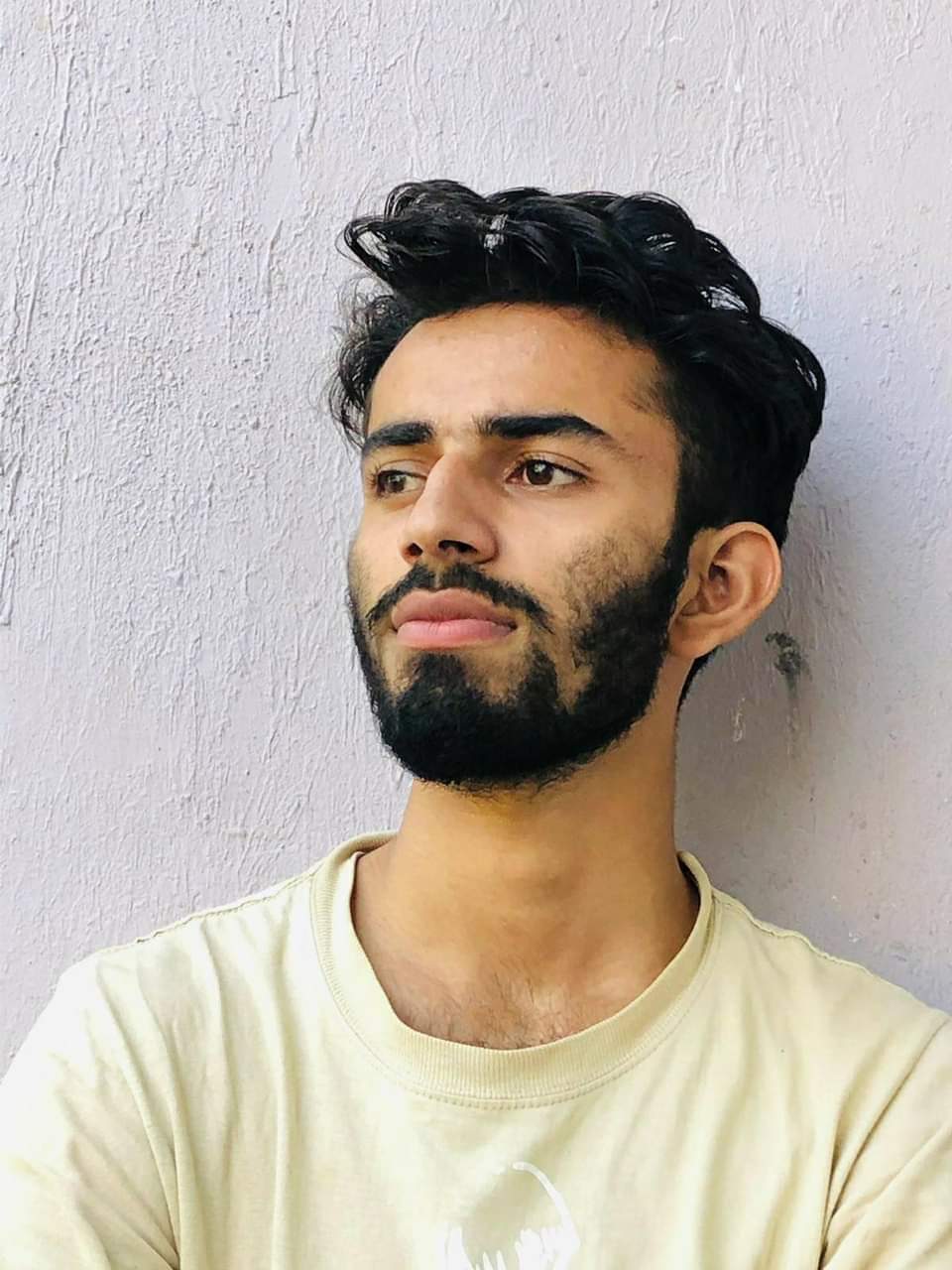Fiction Park
A festive Lakeside
As a host, I was supposed to guide my guests through the city, take them to places they had only read about—and recommend foods that would appeal to their taste buds.
Sugam Gautam
A few hours before you went to the literature festival, you sent me a picture. In the picture, you were adorned in a red jacket and blue jeans, with glasses perched on your head as the sunlight strained your eyes. I assumed you were excitedly revealing your eyes—dark, glinting and watchful. Although I hadn’t expected a photo, you sent it out of your excitement about attending the literature festival for the first time.
You had assumed I would attend the festival, so you asked me to meet at the entrance gate. You must have been surprised, perhaps disappointed when I said I was not going to the event. But you didn't ask why I wasn't interested in meeting the celebrated figures nationwide. However, I found it necessary to elaborate on my hesitation to meet those seasoned writers and diplomats and politicians. “They have nothing new to offer. They are predictable,” I reasoned. “Ohh,” was all that you typed.
In the past, several online friends from various parts of the country had invited me to join them when they visited Pokhara. Their liveliness upon arriving in Pokhara was a testament to the city’s elegance and its wonderful water bodies. I never liked meeting people I knew from social media. It’s not out of disdain but due to fear that the encounter with unfamiliar minds would bring the change within me—I was not in the position to let anyone pierce through my sensitiveness.
As a host, I was supposed to guide them through the city, take them to places they had only read about—and recommend foods that must appeal to their tastebuds. Once, a friend’s friend studying in Kathmandu invited me to a cafe that faced the exit gate of an old airport in Mustang Chowk. My friend and I ordered our customary dishes while he studied the menu card for nearly ten minutes before finally settling for Thukpa, a bad choice for hot days in Pokhara.
So when we finished, he asked for a hotel recommendation. The next day, when we met at Midtown Galleria, he complained about the uncomfortable bedding, the colour of the walls and the ragged doormat. If I had followed my instinct, I would have walked away and never turned back to face the whiner.
Meeting new people means exposing yourself to unfamiliar minds that trigger various reactions. Despite the odds of running into like-minded souls being low, people take the chance with high hopes. The meeting I arranged with you was a risk. You would control me; you would ruin my confidence or please my disposition. You would either fill me with insights or humiliate me for not knowing what you knew. The words you uttered would either open up the seam that sheathed my soul or irritate its exterior.
Knowing that you were at the venue, I couldn’t concentrate on the book I was reading. I listened to some music. I tried writing. I thought maybe cooking would keep me engaged, so I bought some meat and entered the kitchen, but lifting a knife to chop the onions seemed a great deal to me. I checked the watch and there were still five hours left for us to meet at the proposed venue. I could go to the festival and meet you, and then we could listen to the panellists together. But would it be a good idea to meet someone in the crowd? The words I spoke to you would reach a dozen more ears, violating our privacy. I had already told you that I would not attend the festival and now attending it might make me look like an erratic guy with poor decisive ability.
I took a shower, got dressed and set off for the venue. As I walked towards the venue, I decided that I would not inform you I was coming. I would try to trace you in the crowd of hundreds of people. You would not believe your eyes when I mouthed your name. It would be a great surprise, I thought.
Barahi Ghat was crammed with people, some known faces, some on the verge of becoming a celebrated figure. The narrow street that led to the venue was congested and walking without colliding with another person was close to impossible. Beggars squatted next to their tin containers, drawing generous people to stoop every so often.
Inside, the atmosphere was animated, with people moving between halls, listening to their idols talk about literature and politics. Pretty faces sat behind the desk of every stall but failed to sell the items spread before them. An old writer with grey hair and spectacles too big for his face was signing his book.
Two halls conducted sessions simultaneously on diverse topics—literature, history, economics, politics and more. Bored-looking boys who had been dragged forcefully to the event sat on the grass, soaking in the winter sun and craning their necks to catch glimpses of gorgeous girls. When I entered one of those two halls, I found that all the chairs were occupied and those who couldn’t sit were standing at the rear. An ageing journalist moderating the session posed a question to one of the panellists—“Democracy has been restored for a long. Are we standing in the position our politicians had promised we would stand with the onset of democratic practice?”
The crowd fell into silence as the speaker raised the microphone to present his banal assertion. I scanned the audience for your face, expecting to see you looking at the stage with your palm propped on your cheek. To my disappointment, my eyes could only spot an abundance of balding heads. I concluded that you were seated in another hall, so I sidestepped into another hall, where a novelist was talking about his craft.
Soon after entering the hall, I spotted you in a red jacket on the third row. Middle-aged women flanked you on both sides, their substantial presence pressing against you. I caught that you looked a bit startled, for you kept looking to your left and right. I focused on the speaker, waiting for him to finish the session so that you could turn around and spot me. To the best of my knowledge, you hadn’t read any book written by that writer, who was now talking about the art of characterisation. “I don’t enjoy Nepali novels,” you had said once, and, smiling, I had replied, “We are similar in so many ways.”
When the session was over, as expected, you turned around fleetingly, but our eyes didn’t meet. Outside the hall, people gathered in circles, laughing and talking, gazing westward at the people unknown about the event and literature in general. I enjoyed spying on you, discreetly following your trail. You walked past stalls, occasionally stopping to examine displayed objects. The bookstall, manned by a bearded guy, mostly showcased Nepali novels. I knew it wouldn’t interest you; you didn’t even bother to study the titles.
If you had chosen to turn around, you would have caught me spying on you, but you kept walking and from a close distance, I watched you slip into the washroom. Afterwards, I did a strange thing—I surprised myself by walking out of the entrance gate and into the crowd of Lakeside. Perhaps you went back to the hall and listened to panellists. Aimlessly, I strolled past gem shops, restaurants and bookshops before turning left at Hallan Chowk. I checked my watch; we would meet at some isolated corner in less than two hours. At a small cafe on the side of the street, I ordered a plate of fish fry and washed it down with two cups of Americano. When I walked back on my way to Barahighat, I ventured into Booksmandala, taking in the scent of fresh, unread books. I picked a paperback for you, the one you had shown interest in.
A throng of exhausted-looking people spilled onto the street, heads shielded by helmets and bags slung on their backs. The swelling crowd on the street indicated that the event had concluded for the day. I cornered myself on the porch of a nearby building and dialled your number.
In less than five minutes, we would meet for the first time and walk together to an unplanned destination, perhaps to Hallan Chowk, passing the eatery I had visited earlier. As we walked together side by side, you might comment on the mundanity of the literature festival, dominated by political discussions. You would talk about the speakers and I would pretend surprised, as if having an epiphany. At the end, when you finished discussing the Nepal Literature Festival, I would say, “Hey, don’t you think the event should have been named “Nepal Political Festival?” You would only laugh, looking at the calm Phewa Lake.




 17.8°C Kathmandu
17.8°C Kathmandu












